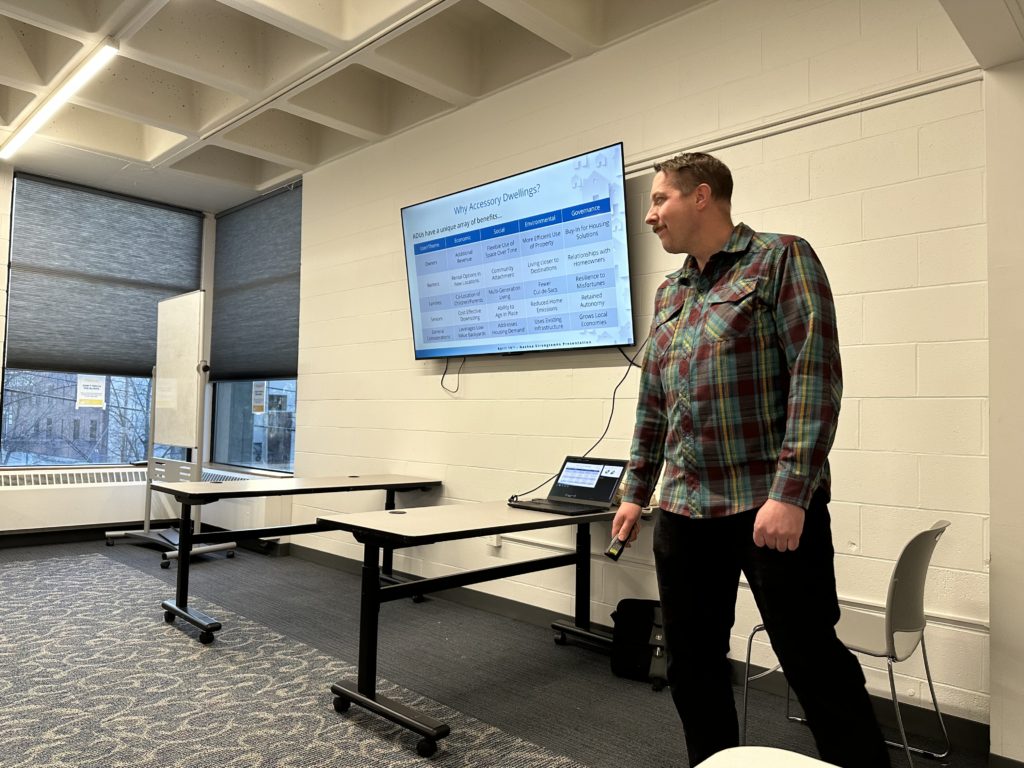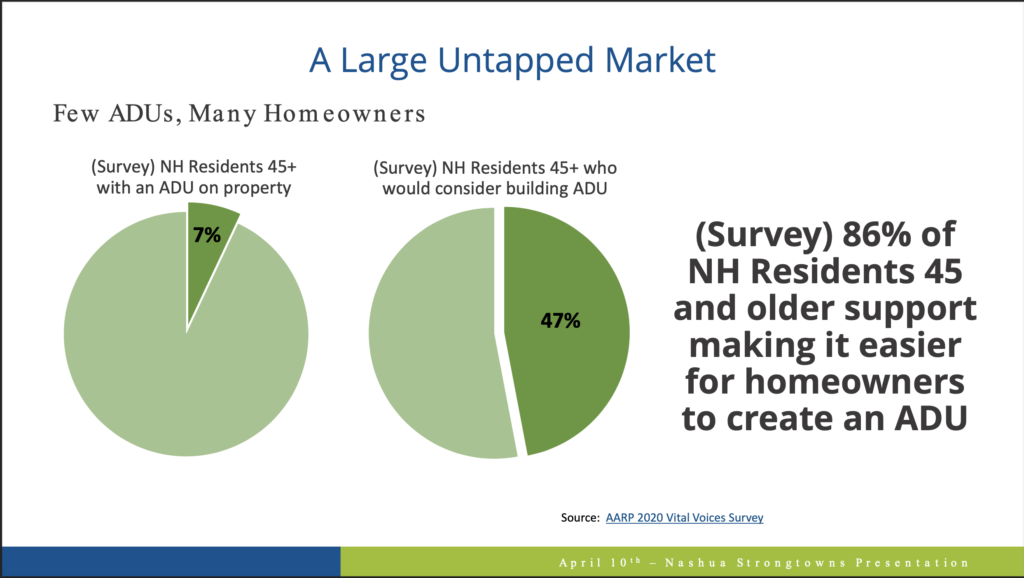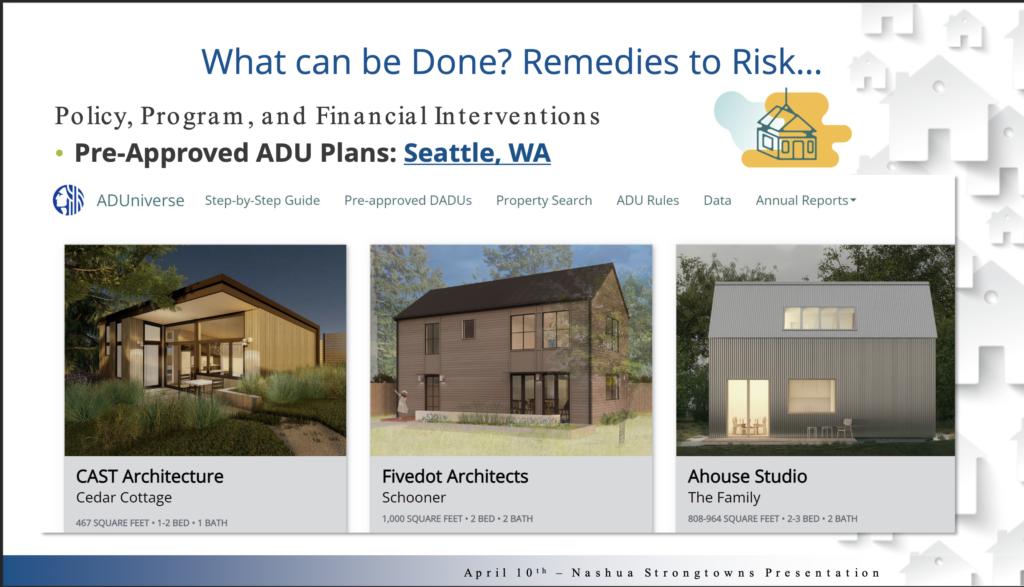Thanks to everyone who was able to make it to our sixth general Nashua Strong Towns meeting. It was great to have everyone here! Yes I did call it the 5th general meeting but it turns out I lost count!
Turnout was great, and we had industry expert and previous Nashua Downtown Specialist – James Vayo there to talk.
Meeting notes below
Before we got into James’ presentation, we did a quick set of updates for the general org. There were three main things to shout out:
- A call out to the great job everyone did emailing about parking minimums and showing up at meetings
- We will continue the conversation further on parking minimums at the next meeting
- A call out to the great job everyone did with the exceptional number of folks who were at the asphalt plant meeting
- An update that we’ll be at the Nashua Sustainability Fair – we hope to see you all there as well!
James Vayo – ADU’s and more

James started by giving an intro of himself. He used to work for the town of Nashua and was the downtown specialist. James did a lot of good work in downtown including helping work on infill development, and overall walkability.
After the intro, we jumped right in and began talking about ADUs – one possible solution to Nashua’s housing/renting crisis, and a potential way of increasing density in strictly single family residential zoned areas.
With regards to notes, the most of the nitty gritty details can be found in James’ presentation (linked at the bottom).
We’ll highlight some key points, areas where folks asked questions, below! For folks interested in getting all the details, make sure to check out the full presentation, it’s a good one!
Presentation/Q&A notes
What is an ADU? ADU stands for Accessory Dwelling Unit. Essentially an additional unit that is added onto a standard, often single family house. Defined legally in RSA 674, Section 71 (link in presentation).
The State of New Hampshire abides by Dillon’s Rule – defined as:
- A municipal corporation can exercise only the powers explicitly granted to them
- Those necessarily or fairly implied in or incident to the powers expressly granted
- Those essential to the declared objects and purposes of the corporation, not simply convenient, but indispensable
In the state of New Hampshire, because of this ADU’s are required in all local cities and towns. However, cities and towns can (and do provide) their own restrictions on ADUs. Nashua for instance requires that ADUs be directly connected to the property on which it is an accessory dwelling unit to.
There are a number of other restrictions that come with this as well, including that there must be a door directly from the ADU to the main dwelling unit, meaning that detached ADU’s are illegal in Nashua. Many of the intricacies are included in the presentation (see slides 10-15).

For residents across Nashua, ADU’s are incredibly popular. 7% of homeowners in Nashua already have an ADU in some capacity, while 47% of residents aged 45+ would consider building an ADU.
House sizes have generally increased since the year 1985, while at the same time, number of residents per house in general has gone down, which is likely part of the reason it is so popular. As Discussed – ADU’s are a political slam dunk for the most part.

Question – 4 units by right law
In New Hampshire at the state level, there has been some push to allow for all houses without any restriction under single family zoned areas to create 4 detached accessory dwelling units. This has been brought up a number of times and has been closely struck down. It is quite contentious.
A question was brought up requesting to know James’ thoughts on it as well as others.
From one member – One of the troubles in Nashua and many other places in New Hampshire is that the sewer system is very old. In some places it would be disastrous to allow for explosive growth. If given more control, the town would certainly like to increase access to ADU’s, but in a more controlled way to make sure the sewer system can handle it.
From James – ADU’s are not the harbinger of infrastructure issues. He recommended to allow the law through and put a moratorium on development in areas where the sewer system is strained. There should not be restrictions on ADU’s that do not equally affect single family houses.
Presentation – continues
Given the restrictive nature of ADU’s, especially in New Hampshire, folks often opt not to have an ADU even if there is desire to have one, and all of the financing options work out.
To request an ADU means getting planning board approval which can drastically slow down or stop the process, and can add immense cost (up to 20% of the build) to the actual process of making an ADU. Most people do not have that level of risk tolerance and will not make it (legally) in the first place.
Some of the fees included that end up causing such a high cost can include:
- Paying for a surveyor
- Paying for an architect (not just for build but for re-assessing)
- Paying for a civil engineer
- Submitting the plan to the planning board multiple times
- And more!
Proposed solutions

James proposed 4 different possible solutions for smoothing out the process of getting ADU’s in Nashua that have been done elsewhere. These are discussed in depth from slides 24-27. In short, some possible solutions are:
- Preapproved ADU plans (engineer stamped and ready to go) making paperwork simple and straightforward
- Predevelopment loans to kickstart ADU development in the town
- ADU design competition to get public interest in ADU’s
- Allowing for modular ADU’s (prefabs that can easily be bought and placed near the house).
And with that the presentation was complete.
Post-presentation/Q&A
We continued discussing ADUs as well as other had time for a few other questions. These are included below. Italicized text is an asked question, while non-italicized text is either James’ response or what he was saying.
One member talked about how they lived in an illegal ADU while in California as it was the only option and was worried about their safety and saw that as a concern.
As an answer – James strongly recommended making ADU’s easier to build. There is strong interest for ADU’s in many communities, definitely in California and definitely in New Hampshire as well. If it is too difficult to legally build an ADU, many residents will continue to make “illegal” ADU’s to varying degrees of safety. Ensuring the process to make an ADU is easy and straightforward is critical to making sure that they are built safely and to code.
Where does Nashua fall with respect to ease of building ADU’s?
Nashua falls on the more conservative side with regard to allowing ADU’s to be built. It has many restrictions that other cities in New Hampshire do not such as:
- Not allowing detached units
- Requiring a door between the ADU and the main unit
Towns can choose to enforce rules like this or not, and Nashua takes a very strict approach to this that adds to the housing crisis.
How do ADU’s contribute to a town’s finances? To they provide more taxable revenue than they cost?
They most certainly do. Denser housing contributes hugely to the profitability of an area. ADU’s help increase density at low cost, providing much needed additional tax revenue to the town.
As an example, James recommended looking at the taxable revenue per acre between Tanglewood Drive and Chandler Street. Despite there being many higher cost houses in Tanglewood Drive, Chandler Street provides a much better return on investment with regards to amount of tax returned per acre.
Have you ever heard of Neighborworks?
James noted he actually worked on the board of Neighborworks for 6 years! Neighborworks is an organization trying to densify and provide more affordable housing. There is a version specifically for New Hampshire here. Neighborworks is trying to find ways to make building ADU’s more easily, including possibly seeing if state funds can be used to create income restricted ADU’s.
As a very large portion of Nashua is zoned as strictly single family, residential, it is extremely difficult to create more density. Much of the areas zoned for dense development are already either:
- Bought and used for dense housing (or something else)
- Bought and not used for anything (land speculation)
Ensuring the zoning code is updated to allow for densifying areas is critical to making sure there is affordable housing to go around, funding the town, and ensuring there are fewer land speculators.
Resources
Full presentation can be found here: ADU-Pres_Nashua-Strongtowns_23-0410
And can be downloaded directly with clickable links here.
0 Comments